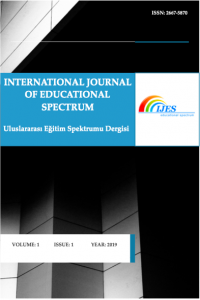Öz
Kelime öğrenme deneyimi dil öğrenmenin en zaman alıcı
yönü gibi görünmektedir. Öğrenciler, her şeye rağmen çoğu halde unutacakları,
listeler halinde bağımsız kelimeleri ve sınav kelime listelerini ezberlemek
için muazzam enerji harcamaktadır. Kelimeleri ezberlemek ve akılda tutmak için
öğrencilerin benimsediği farklı öğrenme stratejileri mevcuttur. Kelimeleri
parçalarına ayırmak bunlardan bir tanesi olsa da kelime kökleri ile öğrenmenin
faydaları üzerine az sayıda çalışma vardır. Az sayıdaki bu çalışmalar Latin ve
Yunan kökleriyle kelime öğretme ve öğrenmenin etkililiğini vurgular. Ancak, bu
çalışmalarda bu stratejinin uzun dönem kalıcılık üzerine etkisi
görülememektedir. Bu araştırmanın amacı kelime köklerinin yeni öğrenilen
kelimelerin uzun vadede akılda kalıcılığı ve öğrencilerin yaklaşımları üzerine
etkisini incelemektir. Araştırma boyunca nitel verilerle destekli betimsel
çalışılmıştır.
Anahtar Kelimeler
kelimelerin hafızada tutulması İngilizce kelime öğretimi Latince ve Yunanca kelime kökleri öğretimi
Kaynakça
- Cambridge Michigan (2017). CEFR. Retrieved on the 20th of October, 2017 from http://cambridgemichigan.org/institutions/products-services/tests/placement-progress/mtelp-series/levels-scoring/
- Fan, M. (2003). Frequency of use, perceived usefulness, and actual usefulness of second language vocabulary strategies: A study of Hong Kong Learners. The Modern Language Journal, 83(2), 222–241.
- Farrokhi, F., & Mahmoudi-Hamidabad, A. (2012). Rethinking convenience sampling: Defining quality criteria. Theory and Practice in Language Studies, 2(4), 784- 792. Retrieved from: https://search.proquest.com/docview/1328999118?accountid=165093.
- Ilson, R. (1983). Etymological information: Can it help out our students? ELT Journal, 37, 1, 76-82.
- Marshall, M. N. (1996). Sampling for qualitative research. Family Practice, Volume 13, Issue 6, 1 January 1996, Pages 522–526. Retrieved from: https://doi.org/10.1093/fampra/13.6.522.
- Nation, I.S.P. (2013). Learning vocabulary in another language. Cambridge University Press (Second Edition).
- Oxford, R.L. & Scarcella, R.C. (1994). ).Second Language Vocabulary Learning among Adults: State of the Art in Vocabulary Instruction. System 22(2), 231-43.
- Patel, M.F. & Jain, P. M. (2008). English Language Teaching: (Methods, Tools & Techniques). Sunrise Publishers & Distributors.
- Qian, D.D. (2002). Investigating the relationship between vocabulary knowledge and academic reading comprehension: An assessment perspective. Language Learning, 52, 513-536.
- Teng, F. (2015). Assessing the Relationship between Vocabulary Learning Strategy Use and Vocabulary Knowledge. PASAA: Journal Of Language Teaching And Learning In Thailand, 49, 39-65.
Öz
Vocabulary
learning experience seems to be the most time consuming aspect of language
learning. Learners exert considerable energy on words trying to memorize
isolate words and sets of exam words which are, in most cases, bound to be
forgotten. There are various learning strategies adopted by learners of English
to memorize and retain words. Dissecting words into word parts is among these
although there are few studies dwelling on the benefits of teaching word roots.
Those few studies highlight the effectiveness of teaching and learning
vocabulary through Latin and Greek roots. However, they lack any answers as to
how much this strategy works in terms of retention in the long run. The aim of
this study is to show the impact of teaching word roots both on learners’
attitudes and the long term retention of newly learnt lexical items. A
quantitatively supported descriptive study was administered throughout the study.
Anahtar Kelimeler
retention of words teaching English vocabulary teaching Latin and Greek word roots
Kaynakça
- Cambridge Michigan (2017). CEFR. Retrieved on the 20th of October, 2017 from http://cambridgemichigan.org/institutions/products-services/tests/placement-progress/mtelp-series/levels-scoring/
- Fan, M. (2003). Frequency of use, perceived usefulness, and actual usefulness of second language vocabulary strategies: A study of Hong Kong Learners. The Modern Language Journal, 83(2), 222–241.
- Farrokhi, F., & Mahmoudi-Hamidabad, A. (2012). Rethinking convenience sampling: Defining quality criteria. Theory and Practice in Language Studies, 2(4), 784- 792. Retrieved from: https://search.proquest.com/docview/1328999118?accountid=165093.
- Ilson, R. (1983). Etymological information: Can it help out our students? ELT Journal, 37, 1, 76-82.
- Marshall, M. N. (1996). Sampling for qualitative research. Family Practice, Volume 13, Issue 6, 1 January 1996, Pages 522–526. Retrieved from: https://doi.org/10.1093/fampra/13.6.522.
- Nation, I.S.P. (2013). Learning vocabulary in another language. Cambridge University Press (Second Edition).
- Oxford, R.L. & Scarcella, R.C. (1994). ).Second Language Vocabulary Learning among Adults: State of the Art in Vocabulary Instruction. System 22(2), 231-43.
- Patel, M.F. & Jain, P. M. (2008). English Language Teaching: (Methods, Tools & Techniques). Sunrise Publishers & Distributors.
- Qian, D.D. (2002). Investigating the relationship between vocabulary knowledge and academic reading comprehension: An assessment perspective. Language Learning, 52, 513-536.
- Teng, F. (2015). Assessing the Relationship between Vocabulary Learning Strategy Use and Vocabulary Knowledge. PASAA: Journal Of Language Teaching And Learning In Thailand, 49, 39-65.
Ayrıntılar
| Birincil Dil | İngilizce |
|---|---|
| Konular | Alan Eğitimleri |
| Bölüm | Araştırma Makaleleri |
| Yazarlar | |
| Yayımlanma Tarihi | 7 Şubat 2019 |
| Gönderilme Tarihi | 30 Ocak 2019 |
| Yayımlandığı Sayı | Yıl 2019 Cilt: 1 Sayı: 1 |
ISSN: 2667-5870


